News & Media
Percy Qoboza remains a luminary voice for truth and justice in the digital era
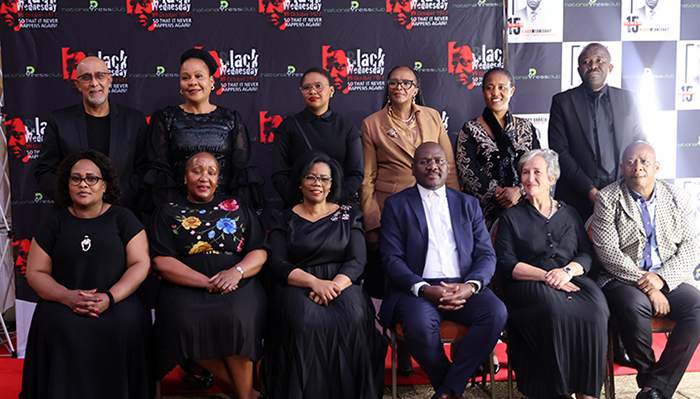
Presenters, participants and representatives of the Qoboza family
"Women should not be silenced in the media space," said Prof Puleng LenkaBula, Unisa Principal and Vice-Chancellor, addressing academics, media practitioners and students at the 15th Percy Qoboza Memorial Lecture hosted by the university in partnership with the National Press Club and the Qoboza family.
Watch a recording of the lecture
The memorial lecture is held annually in remembrance of 19 October 1977, the day when the apartheid government banned black consciousness movements, and newspapers such as The World and The Weekend. This led to the day being recognised as Black Wednesday, and it is also marked as National Press Freedom Day in South Africa.
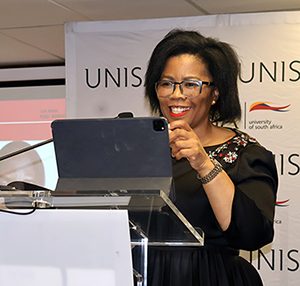
Prof Puleng LenkaBula
The lecture commemorates Percy Qoboza, who is widely known as a social activist and a fearless South African journalist and editor who championed truth and freedom of expression during apartheid. He defended blackness through his writings. This event explored how journalism can be used to uphold justice and the truth, with the lecture’s theme being "From Qoboza to the Digital Age: Journalism, Justice, and the Global Fight for Truth".
In her opening address, LenkaBula urged media students, policy makers and media practitioners to critically engage with media ethics to challenge modern journalism and, most importantly, to promote the inclusion of black women who are often called names, overlooked and undermined. LenkaBula said that it is important to explore media freedom, ethics and the role of journalists in society, especially given Qoboza’s legacy as a fearless voice against apartheid-era censorship.
Language as a tool for emancipation
Continuing, LenkaBula said that it is crucial to amplify marginalised voices and embrace African languages, and not to silence the voices of the country’s history. LenkaBula paused in her opening remarks to acknowledge sign language interpreters for their presence and lauded them for ensuring that South Africa’s 12th official language is recognised for its importance in including persons with disabilities.
"Percy Qoboza’s legacy illuminates not only the global fight for truth and justice, but it reminds us that universities are places that invite excavation of knowledge, critical analysis, comparisons, and sometimes speaking truth to power," said LenkaBula. "Here at Unisa," she added, "we stand for human rights, for voice, for freedom, and for justice, and we are going to ensure that no one is silenced and that all voices find expression. We do so because we understand that this freedom did not come without cost, and that people like Qoboza fought hard for it."
Responding to the theme of the lecture, LenkaBula was appreciative that the keynote speaker, who is the award-winning author of, among others, Constructing Hegemony: The South African Commercial Media and the (Mis)Representation of Nationalisation and Apartheid did not Die: South Africa’s Unfinished Revolution, is a good choice for such emancipatory discussions as misinformation continues to spread and press freedom faces new threats that undermine Qoboza’s commitment to integrity and courage in journalism.
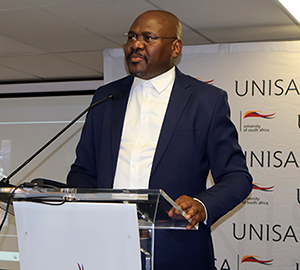
Prof Mandla Radebe
Citing from Frantz Fanon, LenkaBula drew attention to cognitive dissonance discussed in Black Skin, White Masks. Fanon wrote about the experiences that the liberated black elite faced at the time of colonisation and decolonisation, and stated that in the post-colonial period they mimic the very conduct they detested from colonial or apartheid-affirming leaders. Said LenkaBula: "After 31 years of democracy, we must wrestle with how we embody systems, knowledge, ideas and approaches that denigrate the emancipatory agenda, thus undermining the efforts of those building constructive systems, institutions and processes that will build the future of our country."
Gender, inclusion and access
Prof Mandla Radebe, Associate Professor in the Department of Strategic Communication and Director of the Centre for Data and Digital Communication at the University of Johannesburg, delivered the keynote address. He mentioned that media ownership has been hugely criticised, as media control includes race, language, and gender. Radebe spoke at length on the importance of transformation, referring to today’s community voices in digital spaces, which are heavily and increasingly colonised.
In his address, he argued that journalism cannot exist as entertainment, but should serve as a revolutionary act. He also stated that arts, journalism and music in South Africa need to be produced and consumed for the purpose of liberation. Radebe added that it is important to pay homage to Qoboza "not as a journalist but a freedom fighter in advancing the struggle for knowledge to make a difference and free journalism. Journalism should serve as a revolutionary act."
Antoinette Slabbert, Chairperson of the National Press Club, stated that freedom of expression is guaranteed in the country. She referenced recent local stories that reflect the state of press freedom in today’s media landscape. Slabbert, a journalist and Unisa alumna, briefly reflected on how technology is reshaping journalism.
The lecture featured a panel discussion facilitated by Ashraf Garda, host of SAfm’s The National Pulse. Bongekile Macupe, a journalist at News24, Themba Sepotekele, author of Being a Spokesperson, Sophie Mokoena, correspondent at the SABC’s international news desk, and Lennox Klaas, presenter of Radio Freedom, responded pensively and adeptly to Radebe’s lecture.
At the end of the lecture, the Percy Qoboza Bursary recipients were announced, and Professor Rofhiwa Mukhudwana, Chair of the Department of Communication Science, presented the vote of thanks. Programme director Albi Modise, Public Relations Officer of the National Press Club, facilitated the evening’s proceedings with great aplomb and professionalism.
* By Lesego Chiloane, Journalist, Department of Institutional Advancement
Publish date: 2025-10-24 00:00:00.0


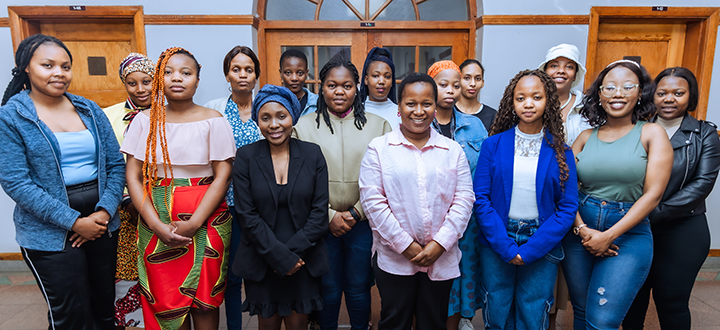 Second cohort of the Bosadi Artisan Creative Media Business Start-up Programme launched
Second cohort of the Bosadi Artisan Creative Media Business Start-up Programme launched
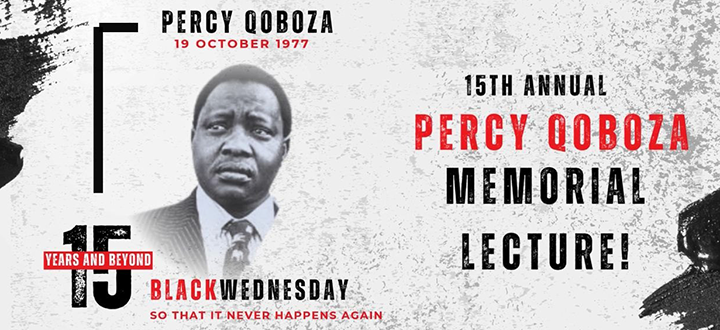 Percy Qoboza remains a luminary voice for truth and justice in the digital era
Percy Qoboza remains a luminary voice for truth and justice in the digital era
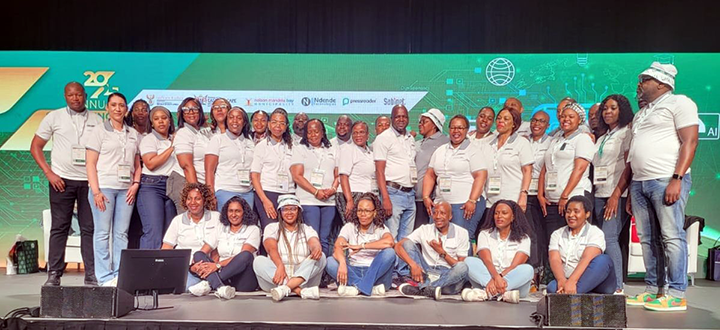 Unisa celebrates excellence at LIASA Conference
Unisa celebrates excellence at LIASA Conference
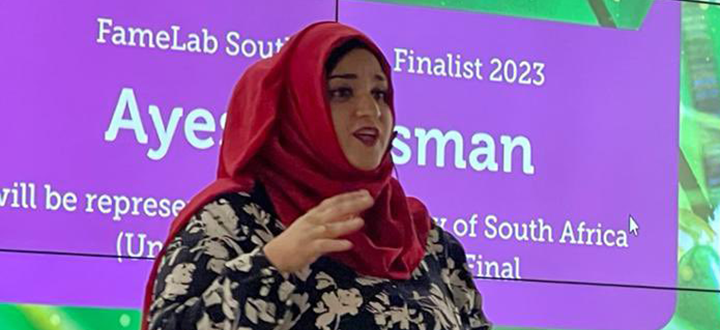 From personal struggles to national reach
From personal struggles to national reach
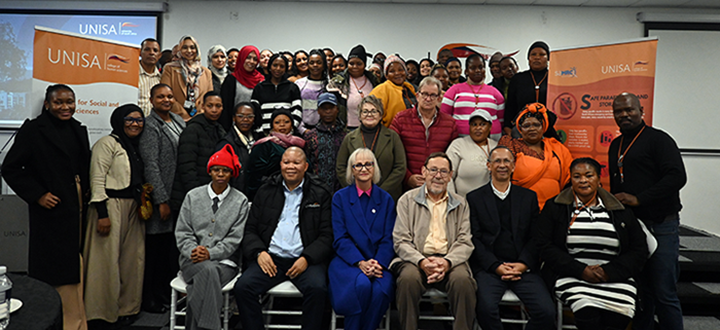 Why South Africans need safer energy alternatives
Why South Africans need safer energy alternatives